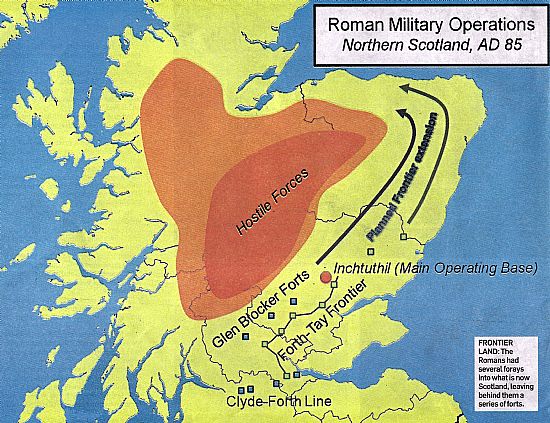
I Told You
Thornie
Added on 19 June 2024
I was looking at a feature article, “The Edge of Empire”, in the Courier, More explicitly, at the large diagrammatic map topping the page. And my blood pressure was rocketing.
I could hear a ghostly chuckle and then Uncle Con saying, “Dixi vobis”.
I told you.
And indeed, he had. Uncle Con warned us more than 1,900 years ago. Britain’s favourite Roman historian, Publius Cornellius Tacitus (AD 56 – c. 120). Author of the Annals, the Histories, and other major works, including the one that matters most to us, his first, De vita et moribus Iulii Agricolae : on the Life and Character of Julius Agricola. For Agricola was governor of Britain from AD 77/8 - 83/84, responsible for pushing the Roman Empire to its furthest northern extent, and for crushing the Caledones at the battle of Mons Graupius. Supposedly.
High times on the Frontier, indeed.
The Agricola is, i n part, a relentless narrative of events and campaigns, with some observations of the geography and ethnography of mainland Britain. Although modern archaeological evidence calls some (and some would say many) of Tacitus’ facts into question . . . and never bone nor rusty blade from such a battle as Mons Graupius has ever been found . . . nevertheless we are so very lucky to have such source material.
n part, a relentless narrative of events and campaigns, with some observations of the geography and ethnography of mainland Britain. Although modern archaeological evidence calls some (and some would say many) of Tacitus’ facts into question . . . and never bone nor rusty blade from such a battle as Mons Graupius has ever been found . . . nevertheless we are so very lucky to have such source material.
Two things to bear in mind, though. Tacitus was Agricola’s son-in-law. And he had an agenda when he finally published this biography. Item 1: Big up the old man. Item 2: damn a servile, supine Senate that had grovelled to Emperor Domitian for its dereliction of duty.
The Agricola is a literary work; and more moral tract than straightforward historical biography. And with Tacitus facts often play second fiddle to a good metaphor. He even invents a hero, the Caledonian warlord Calgacus (otherwise unknown to history), whose ferocious oratory is recounted at length. With some of the best “Freedom!” lines . . . ever:
[True that, even if the obedience and restraint Tacitus condemns here was really about Agricola and the Senate - anything for a quiet life - under an increasingly tyrannical emperor.]
[We may appreciate the honesty of Tacitus baring Roman imperialism to the bone here. For him, it’s just a Rhetorical device. He was no anti-imperialist, but a senator who finished his political career as governor of the province of Asia in western Anatolia,]

Earlier in the work, when recounting Agricola’s cunning plan to Romanise the tribes by taking the children of their leaders hostage and sending them south to be educated, Tacitus had delivered his warning:
Step by step they were led to things which dispose to vice - the lounge, the bath, the elegant banquet. All this in their ignorance they called civilisation, when it was but a part of their servitude.
And I was looking at the fruits of that warning in this article. Unthinking acceptance that this vile and bloody invasion was the natural order of things. Putting down ‘Hostile Forces’ to advance civilization. Indeed.
It’s the world turned upside down.
What if the caption box read: RUSSIAN MILITARY OPERATIONS UKRAINE, AD 2023?